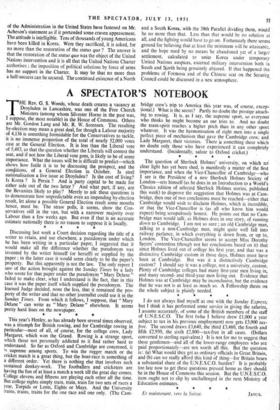This year's Henley, as has already been several times observed,
was a triumph for British rowing, and for Cambridge rowing in particular—most of all, of course, for the college crew, Lady Margaret, which won the Grand. Rowing is a strange sport, which those not personally addicted to it find rather hard to understand. So far as Oxford and Cambridge are concerned, it "ic supreme among sports. To win the rugger match or the cricket match is a great thing, but the boat-race is something of a different order.' Yet there is nothing else that involves such sustained donkey-work. The footballers and cricketers are having the fun of at least a match a week till the great day comes. College elevens and fifteens are playing each other all the time. But college eights simply train, train, train for two sets, of races a year, Torpids or Lents, Eights or Mays. And the University trains, trains, trains for the one race and one only. (The Cam- bridge crew's trip to America this year was, of course, excep-' tional.) What is the secret? Partly no doubt the prestige attach-. ing to rowing. It is, as I say, the supreme sport, so everyone who thinks he might become an oar tries to. And no doubt the team-spirit reaches a higher pitch than in any other sport whatever. It was the harmonisation of eight men into a single perfect piece of mechanism that gave the Cambridge crew, and Lady Margaret, their victories. There is something there which no doubt only those who have experienced it can completely understand. (Incidentally, salute to Oxford cricket.) * * * *






































 Previous page
Previous page